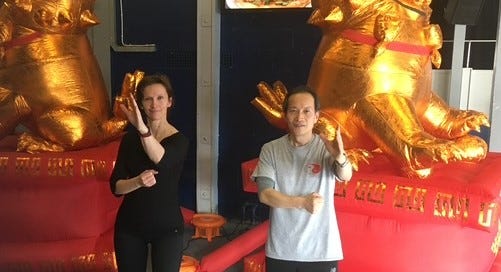The Power of Yielding
True strength isn’t about constantly fighting, but about knowing when to yield and recover.
Tuesday was meant to be a productive day. I had planned to run for 50 minutes as part of my marathon training, and I was also looking forward to recording a video for this Substack newsletter. I was going to showcase how important it is to work in three planes (the geometrical ones, not the ones in the air). Instead, I spent the entire day wrapped up in blankets with my unfinished intentions…
In the past, I would have marched onto the battlefield, armed with determination and a warrior’s mind. I would have wielded paracetamol like a sword, striking down the fever, refusing to retreat. Surrender was never an option! I fought through, no matter what. But now, I am wiser (at least in this area). I’ve learned that the best way forward isn’t always to fight; sometimes, it’s to trust the body’s own defenses and let it heal on its own terms.
Working With The Body…
Of course, it was frustrating. I had goals, and I hate the feeling of leaving things unfinished. But MS has a way of teaching lessons that can’t be ignored. My body needed rest, and I had to accept that. Experience has taught me that if I ignore those moments when my body demands stillness, I’ll pay the price later. Pushing through doesn’t always lead to victory.
Have you ever done Tai Chi? One of the fundamental lessons is that strength does not always come from direct force, but from knowing when to yield and flow with the energy of the opponent. Instead of meeting force with force, a Tai Chi practitioner redirects an attack, allowing the opponent’s energy to work against them.
(The photo below dates from 2018 when I was doing Tai-chi with the amazing Dr Luke Zhang from Tai-chi Guildford.)
This is exactly what happens when we’re sick. Fighting through illness with sheer willpower, that is forcing the body to keep going, only drains energy and delays recovery. Instead, by yielding to the body’s need for rest, we actually work with our system rather than against it, allowing our natural defenses to do their job more efficiently.
Judo follows a similar principle called “Jū yoku gō o seisu” meaning "softness overcomes hardness." A smaller, ‘weaker’ fighter can defeat a stronger opponent by using their own strength against them rather than resisting head-on.
In a way, illness can be seen as a "strong opponent." If we push against it aggressively, we’ll get tired and worse. But if we accept it, adjust our approach, and allow our body to recover naturally, we’ll end up conserving energy and ultimately winning the battle in the long run.
In both Tai Chi and Judo, the lesson is clear: true strength isn’t about constant resistance, but about knowing when to yield and recover. It applies to temporary illness like a cold but what about chronic health conditions such as MS and other long-term health challenges?
… When Living With a Chronic Health Condition
I believe the same principle applies when living with a chronic health condition: we need to know when to push and when to rest, when to challenge our bodies and when to give them the space they need to heal. Just as a skilled martial artist flows with an opponent’s energy instead of resisting it head-on, managing a chronic condition requires understanding our own body: knowing when to yield, when to redirect, and when to conserve strength for the battles that truly matter.
Yes, I know… it’s easier said than done. It takes time, patience, and practice, but I truly believe it’s worth the effort. The key, however, is that no one else can do this for us. I used to think that listening to my body was a waste of time, even a bit selfish. But now, having learned from my own experiences, I know just how essential it is. We are all different: our limits, our needs, our responses. And true mastery, whether in martial arts or in health, comes from respecting those limits and working within them, rather than fighting against them.
What do you think? I’d love to hear your thoughts.
Wishing you a wonderful week.
Véronique





Excellent article. I am trying to organise Tai Chi sessions for my local MS Society. I teach chair-based classes for them but we are looking to add Tai Chi to our timetable with an amazing Chinese insructor friend of mine Your email was very timely! x
Thanks Diane. Yes tai chi is great. I miss my teacher from Guildford. He was great...